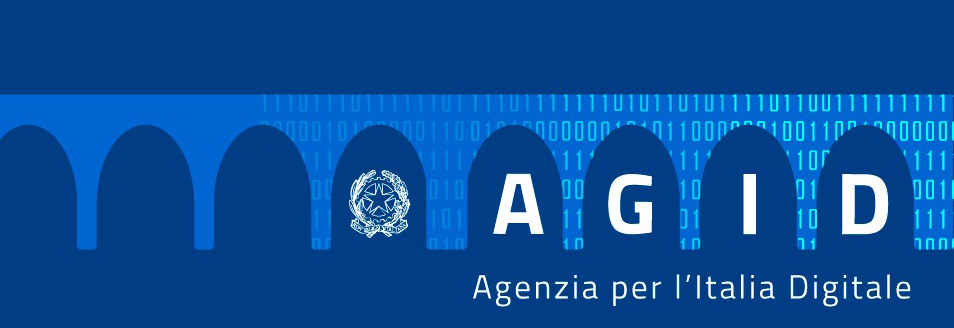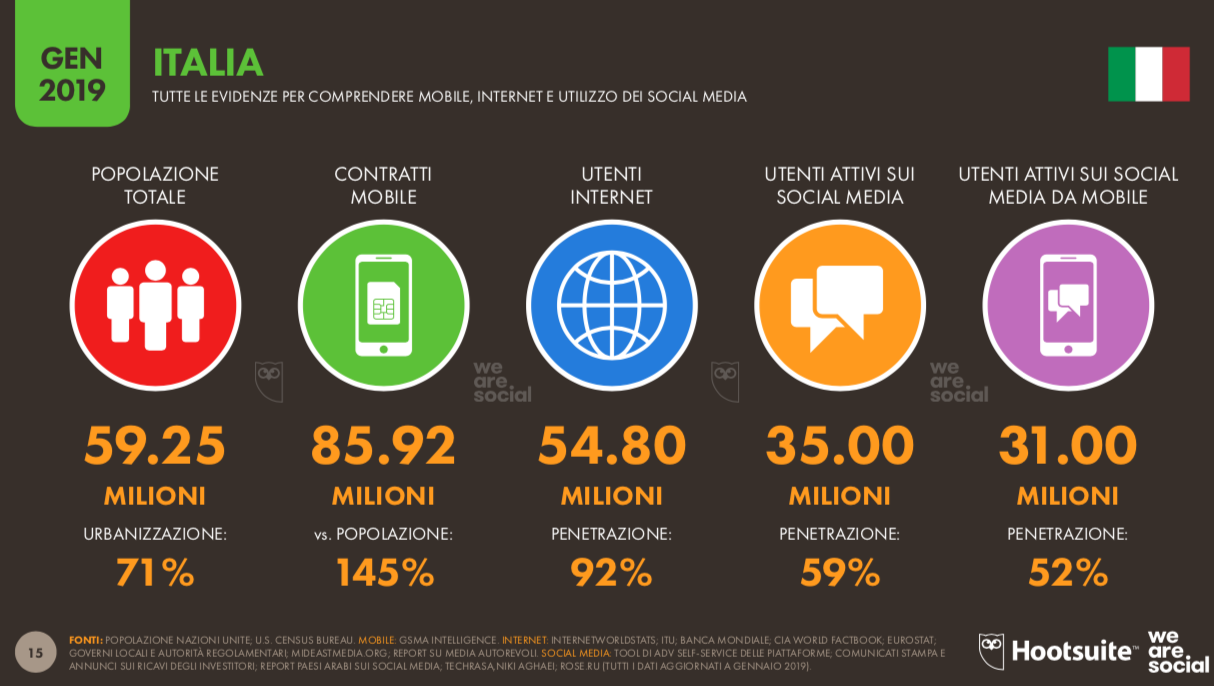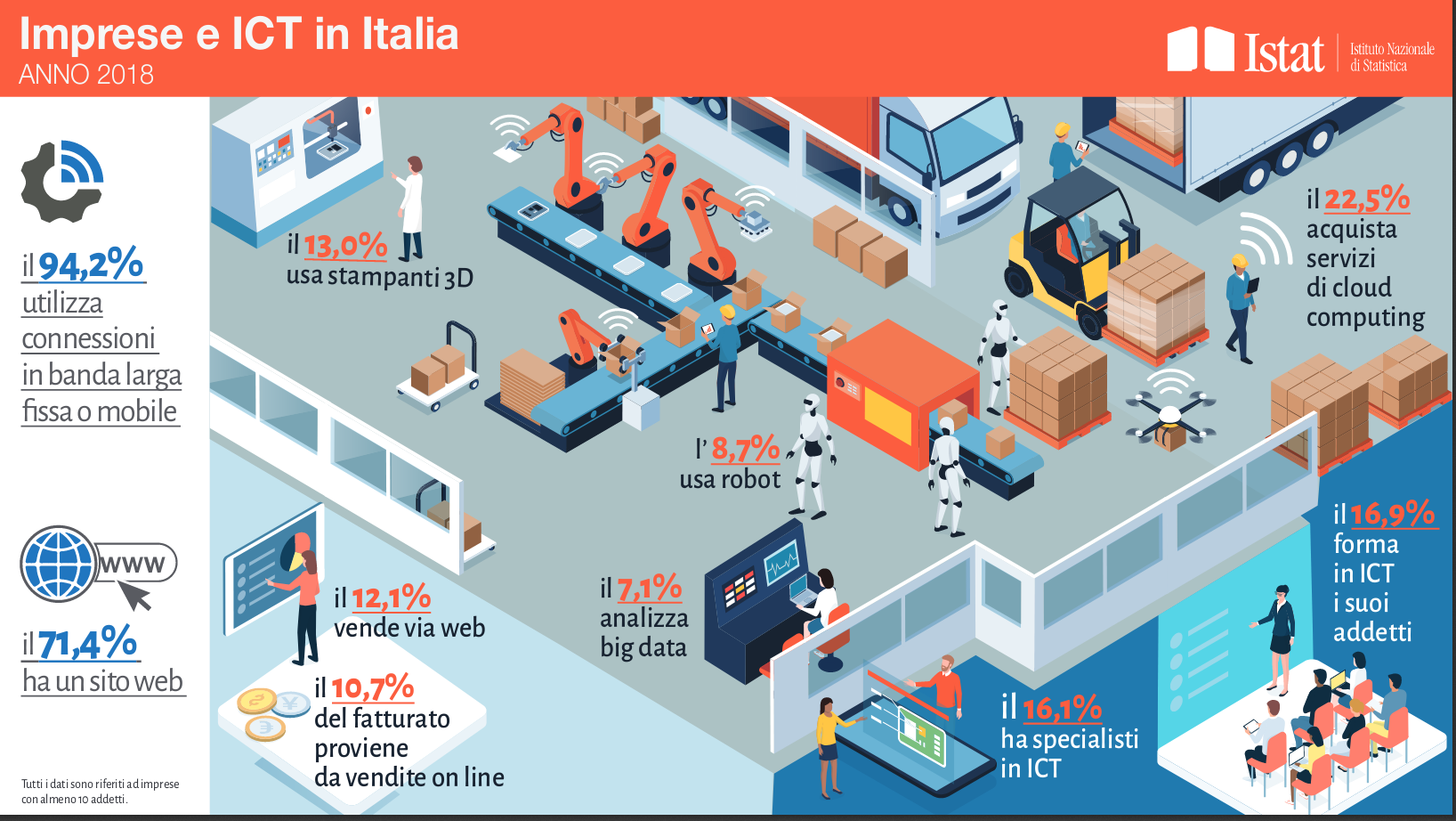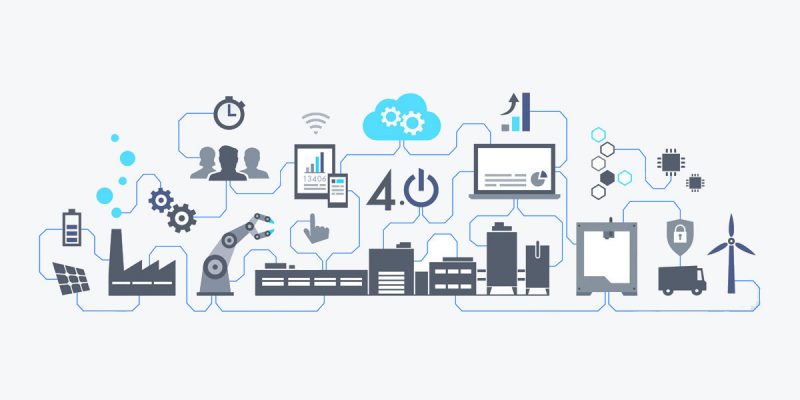Digital Italy. What and how it works
Studying the comments of the respected community to my first article, I realized that the name was indeed chosen successfully, and despite the fact that I am not the only person at Habré I live and work in Italy, almost nothing is known about Italian IT life in wider circles. This is of course strange, if you do not forget about Arduino, ParrotOS, known (albeit in narrow circles) by the Milan company Hacking Team, well, there is more than once mentioned here on Habre Aruba.
But today the conversation will not talk about this at all, and those who are interested can easily find in the network information about the Italian Software House and other galleys, startups, game makers, and so on. Today I want to tell you a little about how digital in general affects the life of Italy and the ordinary resident of the peninsula. It will be about business as a whole and about some aspects of people's lives that are affected by the general tendency of digitalization.
Go
Strong structure

Suddenly, yes?
Let's start from the very top, that is, from the very ones who are all looking at and listening to everything and generally knowing the idea of everyone and everything in the world (especially if in this case the “peninsula” is considered “light”). Why did they get into this article? Because somehow they affect life in the country. There are several offices, among which the most significant are:
- DIS - Security Intelligence Department;
- AISE - External Intelligence and Securiry Agency;
- AISI - Internal Intelligence and Security Agency.
These are the very “celestials” who track everything and everyone here, cooperate with colleagues around the world, catch spies, terrorists, bad hackers, and we all often don’t notice them, because in life, including the Internet of mere mortals if they intervene (and they naturally interfere), they do it very correctly and imperceptibly. According to rumors, they do it also thanks to the software of one well-known company in narrow circles, about which I wrote above. Frankly, I do not even think that most of Italy’s 60 million people suspect the existence of these structures. But then they know exactly the following structure, which is called Polizia postale e delle Comunicazioni .

What it is? These are Internet carabinieri. It is their difficult share of the investigation of all cases of fraud, hacking and other incidents in the Italian sector of the world wide web. On their website, which very few people read, they release allergies on frauds which are in trend for the current period. Most often this is phishing / spaming or frody with contactless cards. Also on their website you can submit an application for the incident and in general find out the latest news about who was detained and for what. According to the incidents. On paper, everything is fine, but ... Last year, one client had a small incident with penetration. Steal did not steal anything, so hooliganism, but a scared customer called the postale. They said, saying, stamp your carabinieri, they will accept the application and they will give us the preliminary materials. The client calls me in horror, screaming something like "Oh, horror, we were hacked I am going to the carabineri" and rushing to the very same carabinieri. Carabinieri issued a form, the client scribbling a statement, I managed to see what was happening on the scene to explain what happened to the most important carabinerine on the phone, he listens attentively, sometimes assents and ... doesn’t understand anything. What is over? And the fact that the main one told me, well, if you find someone and what, then we will immediately connect here and then hoo. And I even understand a little: the incident is absolutely insignificant and no one wants to write a bunch of papers on it. Therefore, I also simply plugged the hole, strengthened the perimeter a little and everything ended there.
Great, we figured out the security forces in our digital, go further.
Gigital for residents

The interaction of residents with the authorities of different levels and health care are probably the most bureaucratic areas in probably any country. With us here with this, too, is not everywhere and not always easy.
Everyone living legally on the peninsula has at least two documents. The first is Carta d'identita, which until recently was a piece of paper with a photo and print, the second is Tessera sanitaria, which is a plastic card with a magnetic stripe and barcode. From this year, the first document is slowly becoming a thing of the past and changing to an ID card. It will not bring an ordinary resident to special nyashek, because it still works more on the territory of the country and more for the needs of identifying who you are, but you can use it to connect to all state resources. The second document for residents is probably more important, because firstly it contains the fiscal code, and secondly, access to medical services in the country passes through this card. That is, through her at the hospital reception desk (I do not know how CUP will be right, honestly), the worker connects to your data and can write out a referral to a specialist or to any tests. One can not fail to mention Fascicolo Sanitario. This is essentially a portal where all visits of specialists are visible, you can order a visit from a narrow specialist yourself without that very CUP, and all the results and recipes are uploaded there too. It works sometimes so user-freandly, that sometimes you want to swear and unscrew the hands that did it, but I must say that the interface and the portal work in general is slowly improving, which allows you to hope that after a certain period of time you don’t have to stomp at every direction to the hospital, especially since normal general practitioners support the patients' desire to save them and their time and prescribe you a prescription without your visit. (Our family doctor likes to use WhatsApp and send everything to the email, for which she thanks) By the way, access to the data in the electronic card is done through a digital identity account, which can be several. I have three, for example. Yes, everyone confirms that I am, I really am, but the administrator certifying my self is different for everyone. One is used just for medical purposes, one to connect to the networks and services of government agencies, and one only to work with an electronic signature.

In general, with regard to interaction with government agencies and not only with them, but generally for global issues of digitalization in Italy, the main body is the Agency for Digital Italy (AgId), which develops plans and coordinates the work of all interested bodies. The bureaucracy, as it should be, is a sea there, but the fact that some issues with the local authorities can be solved by an online request is generally their merit. The main thing that would not stop. I think that for many will seem strange, but the fact that you can really somehow interact with the communal authorities through online services for the country and, above all, the Italian mentality, is really a big step forward. It is a bit annoying that there is still no unification and probably will not, with the result that the portals of various communes (adm. Unit in Italy) have their own set of online services, and some even require presence. It’s good that at least almost everyone has a base of modules for downloading. Other government agencies have also been caught up lately, and if a presence is not needed, then much can be done online (almost all requests), which is immensely pleasing. From the good things of late, the suppliers of gas, electricity and water have finally ceased to be sent every two months for a pack of waste paper, from which joy is simply immeasurable.
Implementers of many initiatives are the guys from the community. it / developers (github / italia) . The most interesting, if not trampled, may be the project IA-Gov, that is, Artificial intelligence at the service of the citizen. In a nutshell, the project is aimed at eliminating bureaucracy when citizens and legal entities appeal to state structures through the automation of procedures using artificial intelligence. Do I believe in such a bright future? Probably not, because I see a lot of things that could be automated without any additional artificial intelligence.
Our Internets

ADSL is ubiquitous, slow and dying, FTTH for individuals is a rare, but fast, other solutions like FTTS, FTTC, FTTB are spread more widely, especially the second one, which has its drawbacks such as dropping speeds, but there is something. The cost of 20 euros per month. In some of our localities, the lines do not wait and then the offers of the wireless connection come into effect, they promise a stable connection and 30Mbit for 25 euros, we get an unstable connection (in bad weather there is no connection) and 10-15 Mbit. It can be said that expensive and slow. Mobile Internet - 4G. Covered 90% of the country, almost does not fall off, but there are still places where it falls to 3G, and for 50Gb of traffic I pay 7 euros per month. There I also have unlimited calls and paid, for € 0.16, SMS, which I do not remember when I used the last time. I’ll immediately add that our digital terrestrial television seems to be about 6 years old everywhere and everywhere, although the process started much earlier, if I’m not mistaken, we first started talking about it in 2006. From this year begins the process of transition to another DVB-T2 standard, which will end at the end of 2021 and it seems like from c 2022 the national 5G network should be launched.
Business

Italy is a country of small towns and small businesses.
There are a lot of small cities here, frazione (administrative unit, town / big village) is even bigger, and small and microbusiness is about 80% of the whole business in Italy. The universal process of digitalization, and under it is meant transformation, implying the use of digital technologies to optimize business processes, increase company productivity, etc., naturally somehow affects all forms of business, be it small or large, but there is one thing: A micro company consisting of one or three people and all there is partita iva, that is, entrepreneurship at the lowest level, this is not about business, this is about self-employment and work, and here business logic most often does not work.
Accordingly, the digitalization too. One laptop with free antivirus and a smartphone with an ever-open facebook and all digitalization. CMR or / and the database is an excel file and this is a super progress that poisons life because for 20 years and without this garbage they coped and everything was fine. Three or five years ago, there were companies that had some small-handicraft production, not having a laptop. Papers gathered, were taken away by the accountant and all. Today it is almost impossible because electronic billing from this year is mandatory for all but the two most simple tax regimes with billing a maximum of 30K per year. Electronic invoicing was run-in at state institutions and to universal responsibility all processes were more or less brought to mind and have not yet heard something break. I don’t really like invoicing in XML format, but as it was decided. Invoices are issued through a special software, carried out through a centralized system and their storage is carried out only in electronic form, which is good news. A lot of small software companies have earned a lot of money on this, considering the annual license cost from € 120. Given that we are talking about millions of users, the amount runs.
In addition to singles there are a lot of small and medium srl, some of them have internal infrastructure, some of them are available in the form of client peripherals and places even with a local server like Poweredge t130 or something, although there are still cases when one of the computers is assigned by the server and already all the others connect to it until it dies. Lately, cheap NAS have started to be installed everywhere, because the GDPR.
The GDPR for this very digitalization in small business served as a kind of impetus for many subjects for the first time for their existence to really see how and where they store their suppliers and customers and systematize the processing and storage of this data, make back-ups and install antivirus from time to time. I am writing for many, because to say "for all" would be an incredible exaggeration. I saw accounting studios that had not even begun to move in order to somehow comply with the new rules, what can we say about their clients, who are small and not so much farmers, electricians and other plumbers.

Who maintains this “infrastructure” in a more or less healthy state? His Majesty Enikeyschik! That's right, with a capital letter without any sarcasm, because without thousands of enikeyschikov all over the peninsula everything just collapses and will not rise again. Enikeyshchik sends networks, repairs scrap metal called a 15-year-old computer, installs software, generally does everything, including folding a small website for a client on his knee. Smart enikeyschik also deals with all the problems associated with the GDPR, which gives him even more money and in general are those wheels that roll the small business into the digital world, slowing down at every turn due to lack of competencies and simply unwillingness to change something and change . Businesses are relying more on small studio firms, which, on an outsourcing basis, are more professionally closing all their digital needs and the higher this level is, the more serious it is, which is generally logical, although there are exceptions. Of the latest innovations - the growth of small data centers that provide their services to businesses in the form of VPS, hosting and everything else. I think that they will occupy their niche thanks, first of all, to their flexibility in the approach to solving customer problems, thanks to which they can compete with their big competitors even at a slightly higher price for services. An example would be, for example, a data center with which I am friends, and that bringing up a client shows server racks (your data will be stored here), getting to know the engineers and system administrators (they will follow everything to work) and so on, which immeasurably improves credit trust and really works better than any advertising.

Big business, which is not much in percentage terms, relies on big brands and generally in the vanguard of all the processes of business digitalization, which is correct, although not entirely logical, because in theory small and medium should be more mobile and susceptible to new opportunities. But this in our case practically does not work, the exceptions are startups and these are mostly technological startups with a focus on IT. Banks and other giants are already quite about IT with their departments, developments and developers; they simply have no choice. Yes, I remember the ATMs with blue screens windowsXP and even NT, but today it is already in the past, as well as the residents' love for cash. The Center-North of Italy is no longer about banknotes but about cards and there have already been cases of real surprise when the owner or the seller of the store saw cash. The popularity of mobile terminals has led to the fact that small-small shops and even newsstands are not at all embarrassed by the outstretched card, but will calmly accept payment. Bars and tobacco shops do not give up so far, but I think this is a matter of time, although as far as bars are concerned, I am against it. Still, it is a certain part of the lamp-warm and fragrant ritual.
Epilogue

Italy is a country of traditions, and Italians are traditionalists to the core. Nothing has ever changed here without a change of generations. Changes in business processes, schemes of state interaction with residents and the state and business here always went along with the general trend, but always a little irregular, obeying the unhurried rhythm of the change of generations and views on how everything should be. The second very important factor at the present time is that universities and institutes engaged in applied research and industry during the second half of the 20th century determined and will determine in the future the speed and direction of movement of the country. If the current trend of big business and science is digital, Industry 4.0. and all that follows, then small, medium and microbusiness simply have no choice but to follow the example, resisting to the last, creaking with false jaws, especially as customization of goods and services, more fine-tuning for the final consumer of the product by more than hand small productions that are tuned to the desired rhythm can easily overtake in the development of their older and bulky brothers. Today there are small-scale production, where most of the routine is done by automated lines, there are farmers who follow fields and gardens with drones, there are startups who develop solutions using IoT and implement modern telemetry and data processing tools and well, in the end, there is cynical truth - the generation that is so accustomed to doing everything “as it was then” and not able and unwilling to work with the tool that is in demand today is retiring.
PS I think this "review" is over and smoothly move on to some real cases, as far as I will allow all sorts of NDA
')
Source: https://habr.com/ru/post/444406/
All Articles